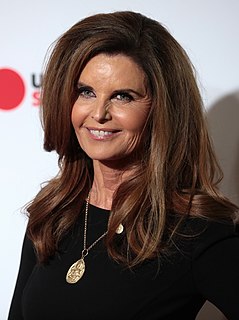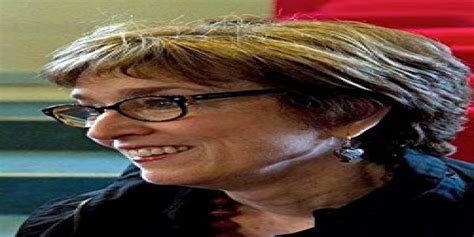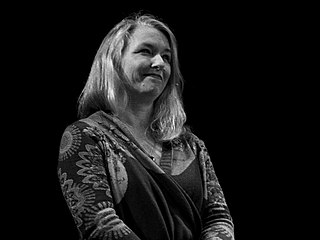Top 1200 Economic Issues Quotes & Sayings - Page 14
Explore popular Economic Issues quotes.
Last updated on December 19, 2024.
In his first year in office, President Obama pulled us back from the brink of the greatest economic crisis since the Great Depression and worked to lay a new foundation for economic growth. The president identified three key strategies to build that lasting prosperity: innovation, investment, and education.
Domesticity is a fact of how social structure works. So if you say, "Well being domestic as a female is a negative trait," then that would be like saying, "Having a family - because that's an economic unit designed to further the economic structures in the world - if you have a family then you're subjugated."
It violates right order whenever capital so employs the working or wage-earning classes as to divert business and economic activity entirely to its own arbitrary will and advantage, without any regard to the human dignity of the workers, the social character of economic life, social justice, and the common good.
People want to know how do they pay for education and they want to figure out how to find and maintain meaningful employment. Education and the economy are polled by Latinos as the top two most important issues. But those are also the issues that everyone cares about, regardless of race; so we don't need to be divided over it.
Perhaps the choice is a negative one, in that I was trying to avoid everything that touched on well-known issues - or any issues at all, whether painterly, social or aesthetic. I tried to find nothing too explicit, hence all the banal subjects; and then, again, I tried to avoid letting the banal turn into my issue and my trademark. So it's all evasive action, in a way.
In my family there was no small talk, only talk about serious things like global politics - trying to interpret the distant political signs, looking desperately for some hope things would change. Religion was forbidden beginning in 1968, when I was born. So my communication with them was limited to issues of everyday life, which were issues of survival.
Economic growth must be the central issue because it is only through growth that the devastating threat of national bankruptcy can be averted. Furthermore, it is only by reviving American economic growth that the West's global predominance can be sustained, and peace and freedom kept secure around the world.
This is the first global crisis that doesn't start in poor countries and it was caused by the rich countries. So it's necessary to take advantage of this crisis - the financial system has to be regulated. It's necessary that the central banks in the world should control a little bit the banks' financing, because they cannot bypass a certain range of leverage. And I believe that there's no other - more any reason for a G-8 group or any other "G." I believe that we should guarantee that the G-20 should be now an important forum to discuss the major economic issues of the world.
If you look at virtually all of the issues of importance to the people of America - issues like making public colleges and universities tuition-free - Hillary Clinton is now on record for doing that for people making $125,000 a year or less. You know what? That is pretty revolutionary. That will transform the lives of millions of families in this country. That's what Clinton stands for.
The United States of America or the Western countries, they don't have a problem with Islamists as long as they are neoliberal capitalists and promoting the economic order. And the best example is the petro-monarchies. The petro-monarchies, they don't want democracy. They say there is no democracy in Islam. But they are within the economic system.
Here's what I don't think works: An economic system that was founded in the 16th century and another that was founded in the 19th century. I'm tired of this discussion of capitalism and socialism; we live in the 21st century; we need an economic system that has democracy as its underpinnings and an ethical code.
These issues that exist among people that we are Iranian and what we need to do for Iran are not correct; these issues are not correct. This issue, which is perhaps being discussed everywhere, regarding paying attention to nation and nationality is nonsense in Islam and is against Islam. One of the things that the designers of Imperialism and their agents have promoted is the idea of nation and nationality.
The future path of the federal funds rate is necessarily uncertain because economic activity and inflation will likely evolve in unexpected ways. For example, no one can be certain about the pace at which economic headwinds will fade. More generally, the economy will inevitably be buffeted by shocks that cannot be foreseen.
I feel like 2013 was one giant snowball of me being confused with my place in life and within the group. A lot of it was self-confidence issues, a lot of outside issues, and a lot of me questioning the future of what I was doing. And my mistake was letting all that influence me so that I wasn't the best I could be in life!
The experience of [the African] bishops is that evangelization itself should be foremost, that the God of Jesus Christ must be known, believed in and loved, and that hearts must be converted if progress is to be made on social issues and reconciliation is to begin, and if - for example - AIDS is to be combated by realistically facing its deeper causes and the sick are to be given the loving care they need. Social issues and the Gospel are inseparable.
The reason so many people misunderstand so many issues is not that these issues are so complex, but that people do not want a factual or analytical explanation that leaves them emotionally unsatisfied. They want villains to hate and heroes to cheer - and they don't want explanations that do not give them that.
My career was always about working with people, and understanding issues and problems and helping them to solve those issues and problems. How you deal with people - that's what diplomacy is all about. So while I'm not a career diplomat, many of the skills I had seemed to directly translate into the diplomatic arena.
On popular issues like poverty and slavery, where Christians are likely to be applauded for our social action, we are quick to stand up and speak out. Yet on controversial issues like homosexuality and abortion, where Christians are likely to be criticized for our involvement, we are content to sit down and stay quiet.
Certain issues in philosophy of science (having to do with observation and the definition of a theory's empirical import) had beenmisconstrued as issues in philosophy of logic and of language. With respect to modality, I hold the exact opposite: important philosophical problems concerning language have been misconstrued as relating to the content of science and the nature of the world. This is not at all new, but is the traditional nominalist line.
Obama and the Democrats' preposterous argument is that we are just one more big tax increase away from solving our economic problems. The inescapable conclusion, however, is that the primary driver of the short-term deficit is not tax cuts but the lack of any meaningful economic growth over the last half decade.
Here's what I don't think works: An economic system that was founded in the 16th century and another that was founded in the 19th century. I'm tired of this discussion of capitalism and socialism; we live in the 21st century, we need an economic system that has democracy as its underpinnings and an ethical code.
My father gave me this poster from National Geographic back in the very early 70s, so I was a young teenager. It showed how man polluted his world. And the issues that they talked about, whether it was water pollution, air, or terrestrial... The issues that they talk about on this poster are still very much present today.
I've had self-esteem issues for a really, really long time. Plenty of people think I'm ugly, and plenty of people don't. But there's a moment when I'm modeling where I forget about my self-esteem issues and focus on what the photographer's telling me - and I feel pretty. And in that sense, it's selfish.
It's not enough to be a woman. You have to care about women's issues. And women's issues here in Iowa are that we have a strong economy. We have jobs that our sons and daughters can go off to someday. We have a great educational system. And women want strong national defense. We want to know that our families are going to be safe.
Music documentaries are hard to tell, but I think they're an amazing vehicle to look at racism, our attitude to sex, the way we judge drugs. There's the ability to get a big audience because of these incredible, iconic, charismatic people. You can look at a number of issues - the challenge is to make sure you choose something that has all those issues. Popular music is like a mirror of culture, of who we are.
How do we fill the need for technology workers, people who have computer skills and math and science skills? How do we get a more diverse science workforce? These are all issues - I would look at these documents that were from the '50s and '60s and '70s, and you'd swear they were written two weeks ago because the issues are the same.
America's peak years of indigenous innovation ran from the 1820s to the 1960s. There were a few financial panics and two depressions, to be sure. But in this period, a frenzy of creative activity, economic competition and rapid growth in national income provided widening economic inclusion, rising wages for all, and engaging careers for most.
I remember the president-elect [Donald Trump] saying that I`m going to do something to dramatically, positively change communities, particularly in urban areas, and I think we`ve got to hold his feet to the fire to all those issues as well as all the issues that you addressed, you and many others addressed yesterday as it relates to criminal justice, as it relates to voting oppression.
Healing works through a kind of detox: things have got to come up in order to be released. That is true of our personal issues, and also our collective issues. We can't just push the darkness down, pour pink paint over it and then pretend it's not there. We have to look at it, accept that it exists and then release it for healing.
I've said this before and I'm very proud of it, that when it comes to judgment, having run a hard race against Senator [Barack] Obama at the time, he turned to me to be secretary of State. And when it comes to the biggest counterterrorism issues that we faced in this administration, namely whether or not to go after bin Laden, I was at that table, I was exercising my judgment to advise the president on what to do, on that, on Iran, on Russia on China, on a whole raft of issues.
We in America were worried about many problems dealing with economic inequality and political inequality. The Communist Party seemed to be the only political force, both concerned and willing, to take action to stop the threat of fascism abroad and to work for economic and political reform in this country.
There seems to be something in the zeitgeist, and maybe it's a function of - I'm no analyst, nor am I a psychologist - when you look at things and say, What if I could go back and change things? I think we live in a world right now where people are asking those questions a lot. What if we could go back and change what we did? How would we change the way we handled things in the Middle East, and how would we change things with the banking industry, and how would we change economic and educational issues?
As the photographer, it's challenging to make images that read quickly and are powerful, but have enough humanity and compassion. I've worked on these issues in the developing world because that's where the risk to girl's safety and access to education is the highest. But that doesn't mean that we don't have issues in the U.S. or western countries. For me, I focused on the developing world because it felt like the issue was more urgent there.
The early pioneers of both wellness and network marketing were motivated by the sense that it was possible to create a better life than the conventional routes offered - better personal health and better economic health, respectively. Now the 'alternatives' of yesterday have become the economic powerhouses of today and tomorrow.
We need a new political language with broader narratives. Such a language has to unravel the pervasive ideological, pedagogical, and economic dynamics of a form of economic Darwinism that now governs much of the world. This system must be demystified, politicized, and recognized for the ways in which it has come to pose a dire threat to democracy.
The Fascist State lays claim to rule in the economic field no less than in others; it makes its action felt throughout the length and breadth of the country by means of its corporate, social, and educational institutions, and all the political, economic, and spiritual forces of the nation, organised in their respective associations, circulate within the State.
In Stage I, divorces were not allowed, so men's [sexual] affairs did not put women's economic security in jeopardy; in Stage II, affairs could lead to divorce, so men's affairs did place women's economic security in jeopardy. We did not want political leaders who would be role models for behavior that would put women's economic security in jeopardy.


























































